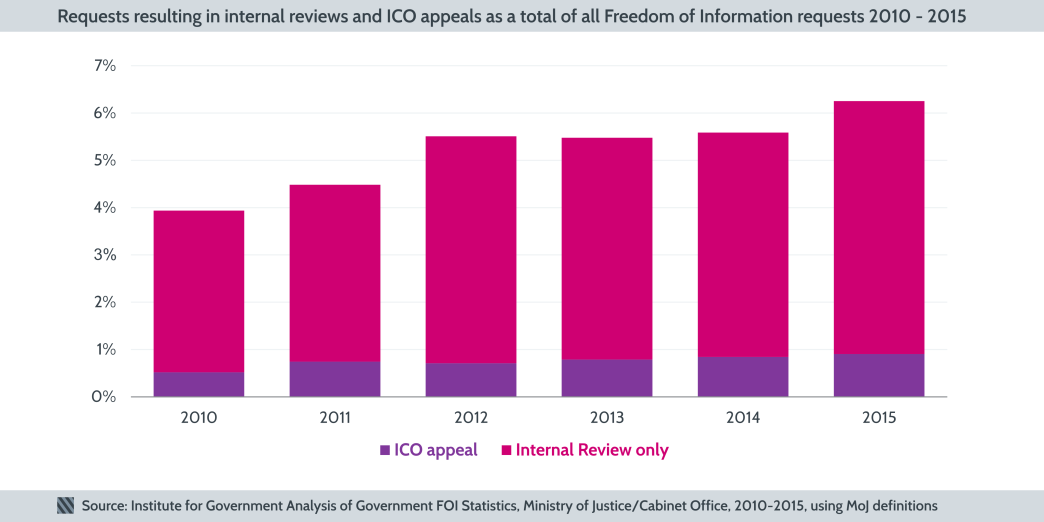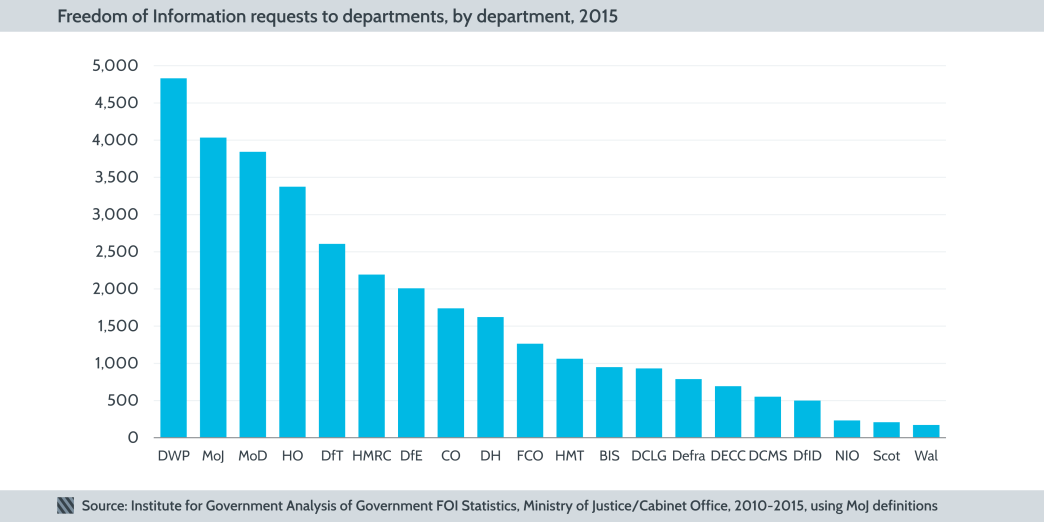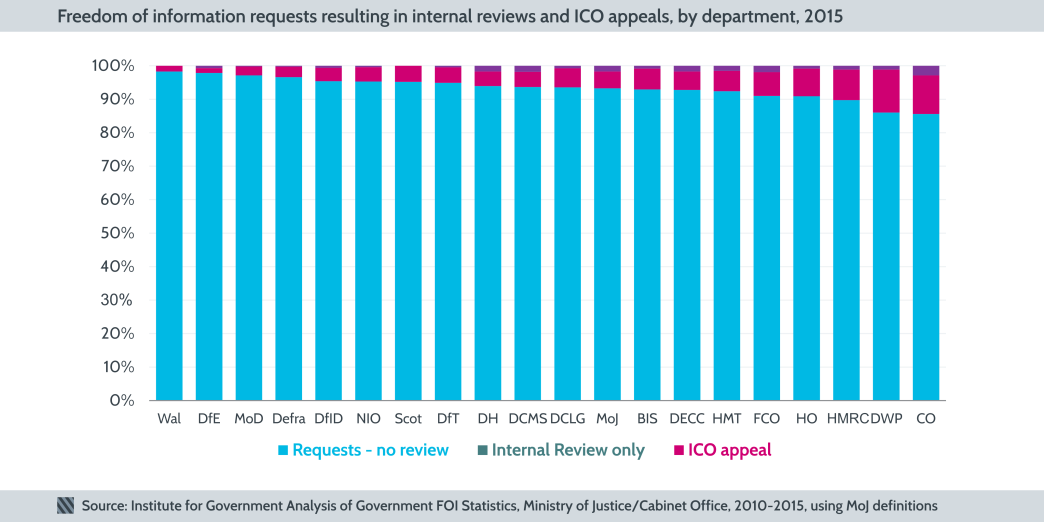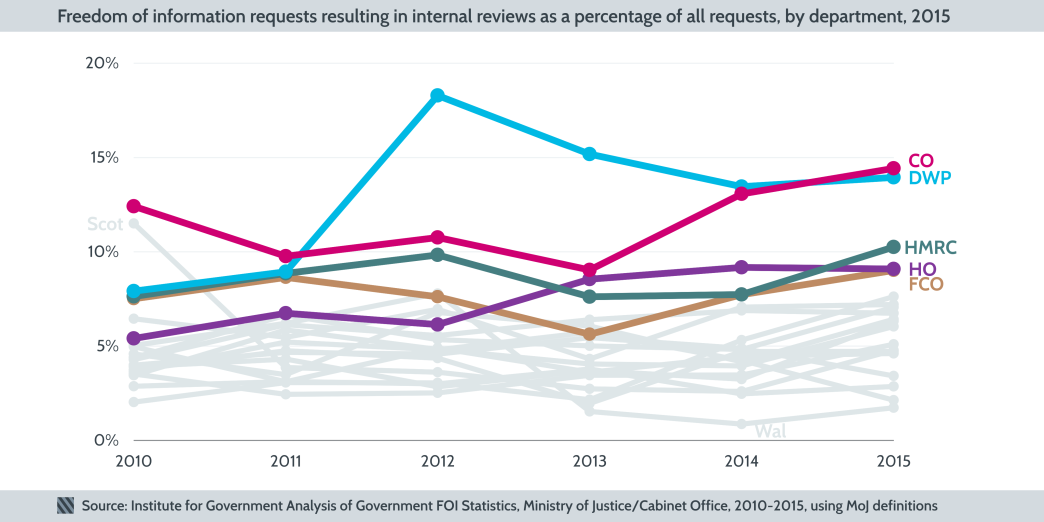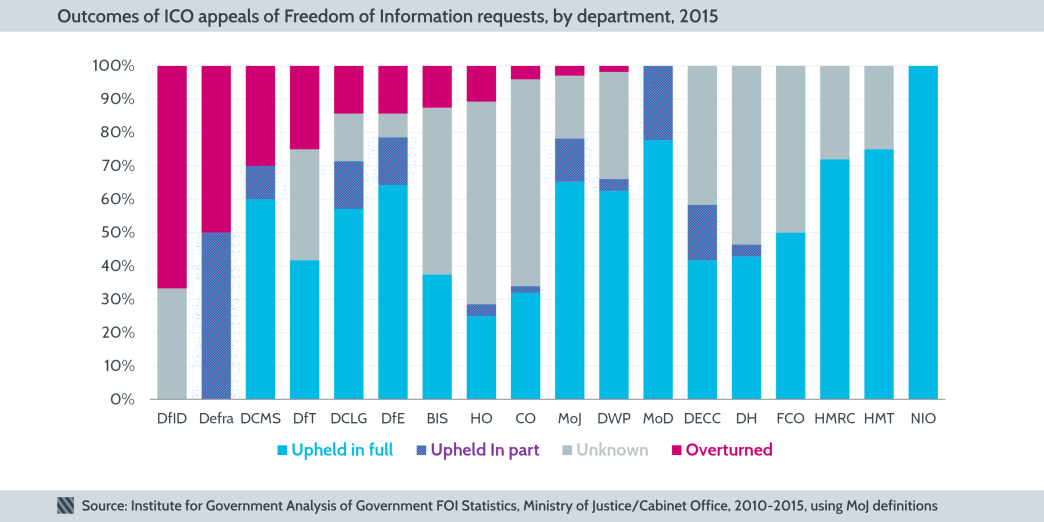Freedom of Information appeals and reviews in 2015
Last week, the Cabinet Office published the annual data on Freedom of Information (FoI) requests in 2015, which includes data on internal reviews and appeals to the Information Commissioner’s Office. Leah Owen looks at what happened when responses weren’t satisfactory to people submitting the original request.
Under the terms of the Freedom of Information Act (FOIA), if someone requesting information is dissatisfied with the response they get, they can ask the department concerned for an ‘internal review’ – which may or may not be acted on. If the requester is still dissatisfied after an internal review is carried out, they can appeal to the Information Commissioner’s Office (ICO). Having looked at quarterly statistics on FoI requests last week, what does the data say about this review process?
The percentage of requests being internally reviewed has increased by 2.3% since 2010.
In 2015, 6.3% of all FoI requests (more than one in 16) were taken to internal review, up from 3.9% (nearly one in 25) in 2010. The number of ICO appeals has gone up from 0.52% in 2010 to 0.90% in 2015 – put differently, 14.4% of internal reviews (a little more than one in seven) were taken to the ICO in 2015, compared to 13.2% in 2010 (a little more than one in eight) in 2010.
The number of reviews and appeals varies by department. Before looking at that, however, it’s worth noting the difference in the number of FoI requests that departments received in total in 2015 – from nearly 5,000 for DWP to fewer than 500 for the territorial offices (Scotland, Wales and Northern Ireland offices).
CO has a higher percentage of FoI requests taken to internal review than any other department, as well as the most going to the ICO on appeal.
CO – the department responsible for handling FoI policy – had the greatest percentage of requests go to internal review. 251 of 1,740 requests received – just over one in seven, or 14.4% – went to internal review. (It also saw a greater percentage of appeals go to the ICO than any other department – 2.9% of all requests, a little more than one in 35.)
DWP, however, had the highest number of requests going to internal review than any other department – 674 requests, up from 628 last year – representing 1.2% of all requests it handled.
After CO and DWP, HMRC, HO, and FCO (at 10.3%, 9.1%, and 9% respectively) had the most cases going for review. At the other end of the scale, three departments – DfE, the Welsh Office, and MoD – had less than 3% of their requests going to internal review (approximately one in 46, one in 57, and 34 respectively).
While CO has switched places again with DWP for the greatest percentage of requests going to internal review (DWP had the greatest percentage between 2012 and 2014, and CO had the highest before that), these two departments have maintained their position as the departments with the most internally reviewed FoI responses, as has been the case for five of the last six years.
MoD has had a greater percentage of decisions overturned at internal review than any other department…
20% of internal reviews at MoD overturned the original decision (22 out of 110, or one in five), more than any other department. Defra and DCMS also had more than 10% of their original decisions overturned.
As in 2014, a noticeable proportion (10.5%) of internal reviews in 2015 came back with an ‘unknown’ result. In 2015, in Defra, 37% of internal reviews – more than one in three, the most of any department – had an unknown result. This reduces confidence in the results – FoI requests with an unknown outcome might not be upheld, upheld in part, or overturned in proportion with those results that we do know. The picture changes on unknown results year-to-year – in 2014, HMT had the highest percentage (49%).
…while DfID, Defra and DCMS have had the greatest percentage of decisions overturned on appeal to the Information Commissioner.
Across government, 428 appeals were made to the Information Commissioner in 2015 – up from 395 in 2014. We are therefore dealing with very small numbers when looking at some individual departments, meaning it’s important to be cautious about some of these figures – if a department had a single case go to appeal before the ICO, and that case was then overturned, the resulting ‘100% of known decisions overturned’ rate should be taken with a grain of salt. Nonetheless, DfID (66.7% - two out of three cases), Defra (50% - one out of two cases), and DCMS (30% - three out of 10 cases) had the greatest number of cases that we know were overturned.
Seven departments – NIO, MoD, HMT, FCO, DH, and DECC – had no known cases overturned following ICO appeals; however, in some cases, such as NIO, only one case was considered, while in others, such as DH, 28 cases were considered.
Reviews and appeals can be representative of a healthy process, but can also highlight dissatisfaction among service users – we’ll examine this again next year with the 2016 data, and monitor what’s changed in the field of FoI internal and ICO review.
